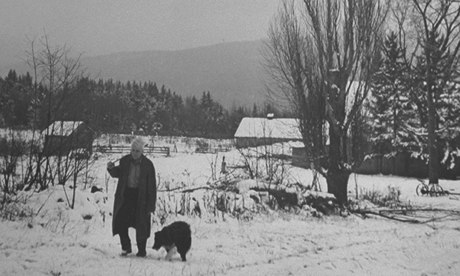
Frost and Dog: Encountering a Photographer
In an article by Baron Wormser entitled “Robert Frost and the Drama of Encounter,” Wormser points out how “Frost prefers to present the situation, which is to say the drama of opposition or indifference” (Wormser). What he means by this is that Frost finds every encounter to be a genuine one or one deserving of analysis or emotional response. That response is not usually a harmonious one when it comes to Frost. Wormser sets up his analysis of Frost and the encounter with suggesting how much of American poetry before Frost spoke to “the American belief in a destiny,” a destiny “that can face down any conflict”(Wormser). However, he says that Frost isn’t apart of this and that his poetry instead represents a poetry that is “stoutly dramatic and reveals in what can’t be resolved”(Wormser)”
For Wormser, this inability to resolve certain dramatic conflicts led many poets like Frost to instead favor what he calls “the wasteful ardor of encounter, incomprehension, and confrontation“(Wormser). This in itself is a very modern practice of Frost’s poetry.
Wormser makes a comparison that at first sight he himself declares to be seemingly risky. This is the comparison between Robert Frost and Emily Dickinson. He points out their both living in New England and their sharing of poetry that contains encounter, incomprehension, and confrontation. He states how they both possess an inward form of scrutiny that was possessed by the puritans. But he chases this claim with the obvious fact that they both rejected theology. He also says that unlike the extremes of Dickinson’s poetry, Frost’s poetry falls more in the middle and is “bewitching, homely, and extreme”(Wormser).
Wormser abandons his comparison of Frost and Dickinson to focus directly on Frost. He begins to discuss the significance of Frost’s poem “Mending Wall” and particularly how the line “it seems to me” makes clear “the narrators limited powers of discernment” to help reference his idea of encounters and their incomprehensibility in nature. Wormser also says that Frost in this poem, and in many of his others, is trying to convey a primitive and self-satisfying nature that humans possess. He also discusses how encounters such as these were interesting to Frost because they were human and natural. Also, Wormser states that Frost was someone who was a roamer that was also questing and questioning. This is something that is highly evident in his poetry.
Wormser also references Frost’s poem “The Woodpile” and further points out Frosts hunger for encounter and how it is a perfect example of the Frostian mode of poetic setting. This Frostian setting consists of a speaker on a walk in nature that has encounter which allows nature to entertain questions on him. This same process of allowing nature to entertain is also, according to Wormser, present in Frost’s poem “The Most of It.” In this poem, Wormser states that Frost is trying point out the limitations of the human ego. In this way, it can be considered Frost having an encounter with the inherently human part of himself that is the ego.
He concludes his article with a close reading of Frost’s poem “For once, Then, Something” and makes clear how it represents our human quest towards some real form of certainty. This certainty that we cannot really attain. Wormser says that it represents how if we look too much into science and rule out the possibility of greater things then we will be wasting an integral part of our humanity. Wormser ends by describing the encounter found in this poem as “a wisp, a glimmer, a shard” to point out how it represents our sincere human uncertainty that Frost tries to manufacture for the reader of this poem (Wormser).
Baron Wormser. “Robert Frost and the Drama of Encounter.” Sewanee Review 119.1 (2011): 76-90. Project MUSE. Web. 30 Jan. 2014. <http://muse.jhu.edu/>.

I like this idea of “encounter” as something fragmentary wrested from some greater whole–something we might avoid in pursuit of “destiny,” but that asks us to stay, question, reflect, and consider. Though Frost can seem a very traditional poet alongside Loy, Williams or even Stevens, it is good to remember how distinct and modern his poetry could be, if not in form, then at least in conception and in its dramatic situation.
I wonder if the author loses some of the descriptive quality of “encounter” when he allows this to involve not just human encounters (as in “Mending Wall” and “Home Burial” but any encounter with a thing or idea. Any thoughts on that?
The bit about the limitations of the ego remind me, as well, of Hulme’s sense that we are fixed and limited, and the role of poetry is not to enact some transcendence, but to explore limitation.
One note on the technical aspects of the post: when you overuse “also” in a summary, it can come to seem list-like and the reader loses attention. Try to use more substantial connectors in the future to link ideas.
Overall, great post!